Having the right tools to host a podcast is really essential to get the most out of your efforts and content. With headphones, the best headphones for podcasting should be easy on your pocket and should deliver exceptional audio outputs.
From beginners to experienced podcast hosts, having the perfect pair of headsets is paramount. But for that, you should have a list of options for you to choose from.
I spent 30+ hours finding the below-ten headphones that would suit your podcast needs and had them tallied with user-preferred options.
The options I noted below vary in terms of their shape, size, and use cases. I have also listed some essential specifications that you should be aware of further below.
Keep reading to find the ones for you!
Top 13 Headphones For Budget Podcasting (Editor’s Pick)
The 13 podcasting headphones I reviewed are for a broad range of users. The list is divided according to the headphones’ price, reviews, and best features.
| Headphones | Best for | Price | Amazon Review |
|---|---|---|---|
| Sony MDR-7506 | Reliability | $130 | 4.7 |
| Beyerdynamic DT 770 PRO | Balanced Audio Experience | $169 | 4.6 |
| Audio Technica ATH-M50x | Three Cable length options | $165 | 4.7 |
| Shure SRH840A | Single ear usage | $149 | 4.5 |
| Sennheiser HD25 | Long hour usage | $150 | 4.8 |
| AKG K72 | Build Quality | $65 | 4.5 |
| Sennheiser HD280 Pro | Noise isolation | $100 | 4.6 |
| Audio-Technica BPHS1 | Built-in microphone | $219 | 4.4 |
| Beyerdynamic DT 1770 PRO | Brilliant highs and bass | $529 | 4.4 |
| Rode NTH100 | Comfort | $145 | 4.5 |
| Audio Technica ATH-m20x | Budget option | $49 | 4.6 |
| Bose QuietComfort 35 | Design and versatility | $189 | 4.7 |
| Shure SRH440 | Editing and mixing | $99 | 4.5 |
Did You Know? More than 464 million people listen to podcasts globally as of 2024 and it is predicted to reach 504.9 million by 2024.
Technical headphones terms glossary
Here are some of the technical terms that you might have or will come across while finding the best headphones for your podcasts.
| Term | Meaning |
|---|---|
| Sensitivity | This refers to the loudness of the headphones |
| Impedance | Translates to the quality and amplitude of the output |
| Frequency response | It is the range of mids, bass, and treble in Hertz |
| Sound Isolation | Blocking of external sound – to favor clean recording |
Let’s explore more and find more details. I explained their pricing, the headphone type, frequency response, and the product link.
Further, I segregated them in increasing order of their price for you to quickly choose one as per your budget.
1. Sony MDR-7506 – Best for Reliability
| Price | $130 |
| Type | Closed-back |
| Mic | No |
| Frequency response | 10 Hz – 20 kHz |
| Product link | Check here |
This is one of the best headphones for podcasting owing to its powerful, detailed sound and straightforward podcasting experience used by many broadcasters and professionals worldwide.
It offers an impressive frequency range of 10 Hz to 20 KHz, a 9.8 feet cord that is actually a key factor for exceptional connectivity with a gold connector, and an Oxygen-free copper cord that adds to its smooth connectivity.
Though the longer cable affected the portability, I feel its ability to fold and closed-back design make it travel-friendly and a reliable noise-isolating podcasting headphone.
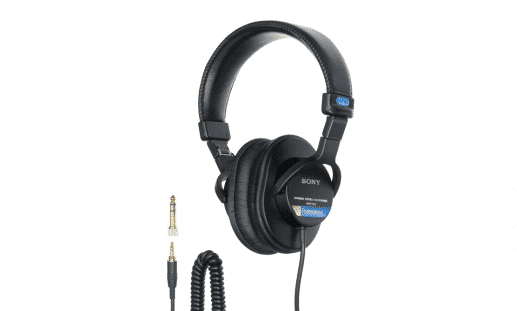
Pros
- Longer audio cable
- Comfortable for longer time periods
- Can be used for single-ear listening
- Foldable and travel-friendly
- Smooth connectivity
Cons
- Long cable can feel heavy
- The cushion material can flake out without proper care
2. Beyerdynamic DT 770 PRO – Best for a balanced audio experience
| Price | $169 |
| Type | Closed-back |
| Mic | No |
| Frequency response | 5 Hz – 35,000 Hz |
| Product link | Check here |
The next headphone offers a quality build that is handcrafted in Germany and offers a perfect combination of audio quality and comfort, and that’s exactly what a podcaster needs. The closed-back design offered greater noise isolation and a balanced and clear audio experience.
The headphones had a variation in the impedance provided with 32, 80, and 250 Ohms for mobile, universal studio, and professional experiences, respectively. The headphones adopt the Tesla technology that offers precise and powerful bass, making it an ideal choice for podcasters.
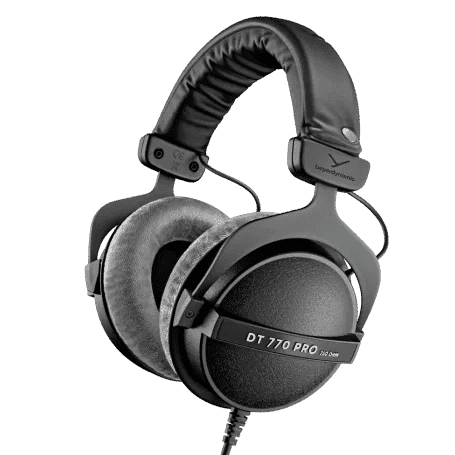
Pros
- Three choices of Impedance
- Earpads for separate use-cases
- Adjustable headband
- Good build quality
- Comfortable
Cons
- Non-removable cable
- Bulky
3. Audio Technica ATH-M50x – Best for its three cable length options
| Price | $165 |
| Type | Closed-back |
| Mic | No |
| Frequency response | 15 – 28,000 Hz |
| Product link | Check here |
Audi Technica is one of the most reliable and best headsets for podcasting. It offers a package of quality, design, and comfort, even with a closed-back design. Unlike the previous model, this one has larger earcups that can be well-suited for listeners for someone like me with large ears.
In podcasting, the headphones help identify sound and dialogue precisely, and the earcups can also swivel 90 degrees, which enhances the editing process. The earcups can also collapse, making it easy to carry around and travel.
The three types of cables offered (1.2 m – 3.0 m coiled cable, 3.0 m straight cable, and 1.2 m straight cable) make it versatile in its usage.
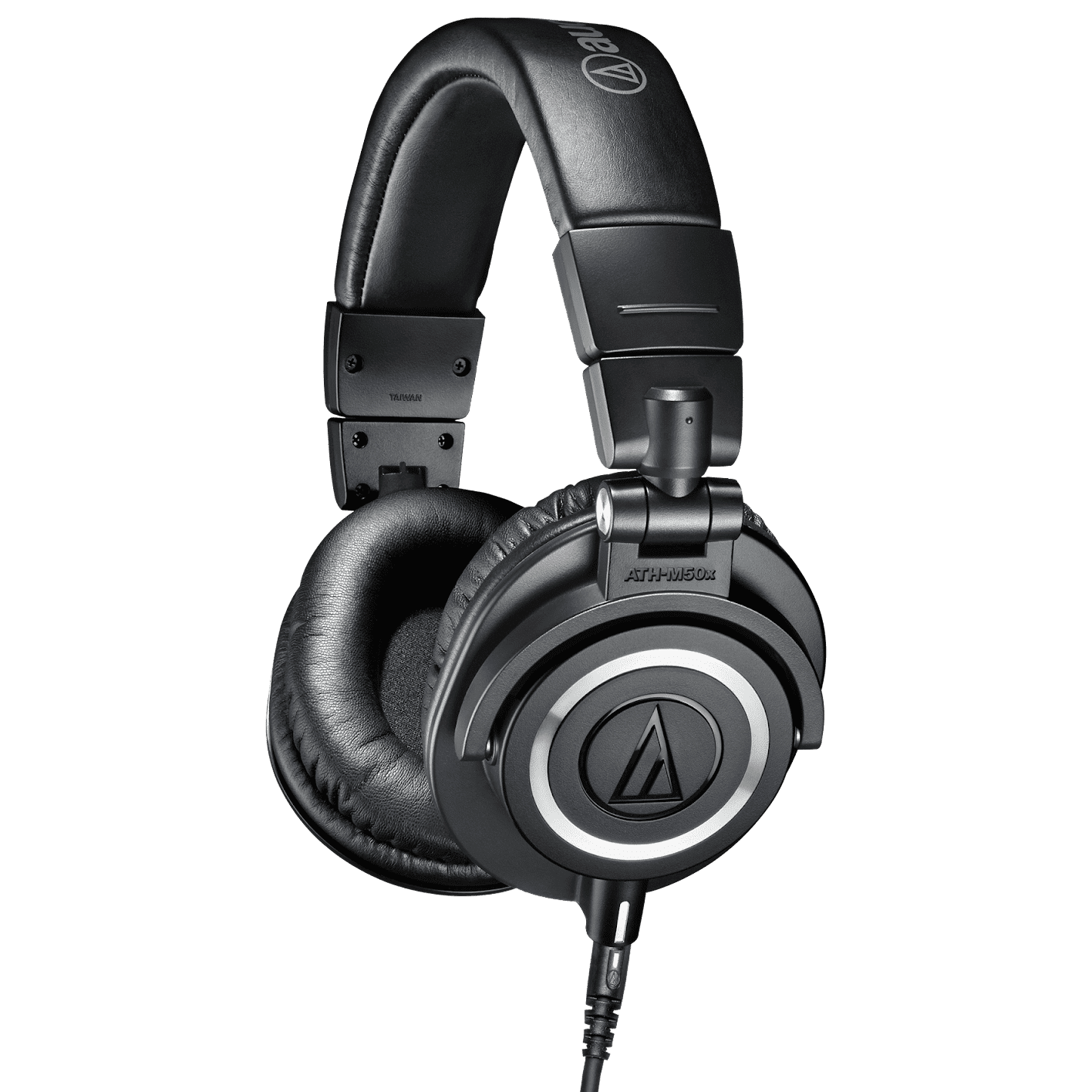
Pros
- Collapsable earcups
- Three cables offered
- 4 color options
- Circumaural design
Cons
- Build quality can be better
- Bulky design
4. Shure SRH840A – Best for single ear usage
| Price | $149.00 |
| Type | Closed-back |
| Mic | No |
| Frequency response | 5 Hz–25,000 Hz |
| Product link | Check here |
The SRH840A moves forward the success of its previous model, the SRH 840. It offers precise and minute editing options. The headset offers premium padding, making it one of the most comfortable and best headphones for podcasting.
I liked how the earcups can swivel, making it usable with a single ear. These features are crucial when it comes to editing part of a podcast. You need a reliable headphone that can do both the recording and the editing.
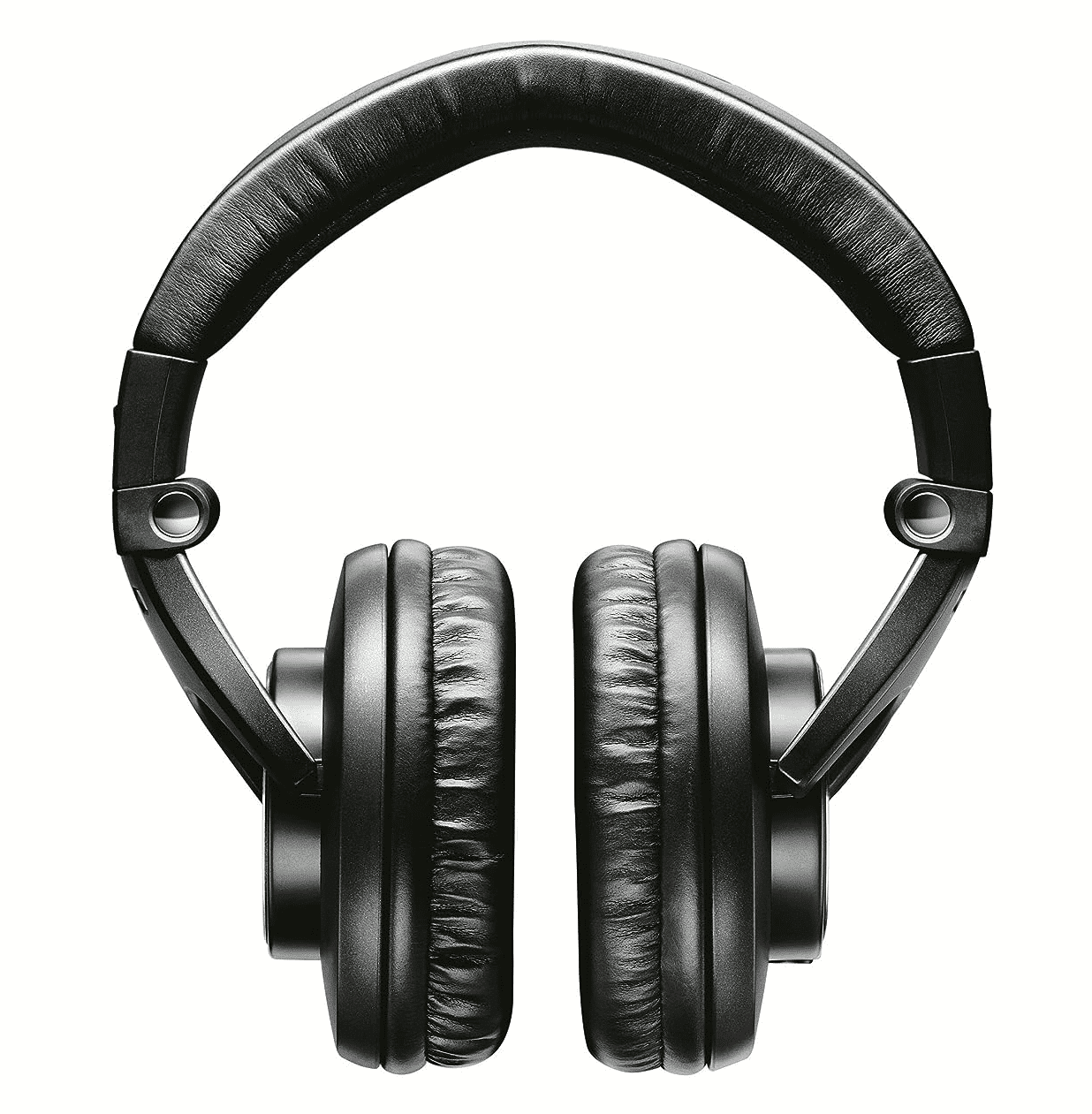
Pros
- Lightweight and ergonomic fit
- Folds flat for better storage
- Two-year warranty
- Single-ear usage
Cons
- Color and shape could be better
- Headphones can feel heavy
5. Sennheiser HD25 – Best for long hour usage
| Price | $150 |
| Type | On-ear |
| Mic | No |
| Frequency response | 16 Hz – 22,000 Hz |
| Product link | Check here |
These are great light-weight headphones that can prove to be reliable equipment for your podcasting needs. The headphones are preferred by many sound artists due to their comfort and higher sound sensitivity. Upon using I found them capable of handling high sound pressure levels and giving out excellent sound isolation.
The capsule can be rotated and used for single-ear listening, which aids the editing process. It has a split headband that makes it comfortable and fits better on the head. Although it is claimed to be comfortable for longer hours, with its on-the-ear design, it can be uncomfortable after a while.
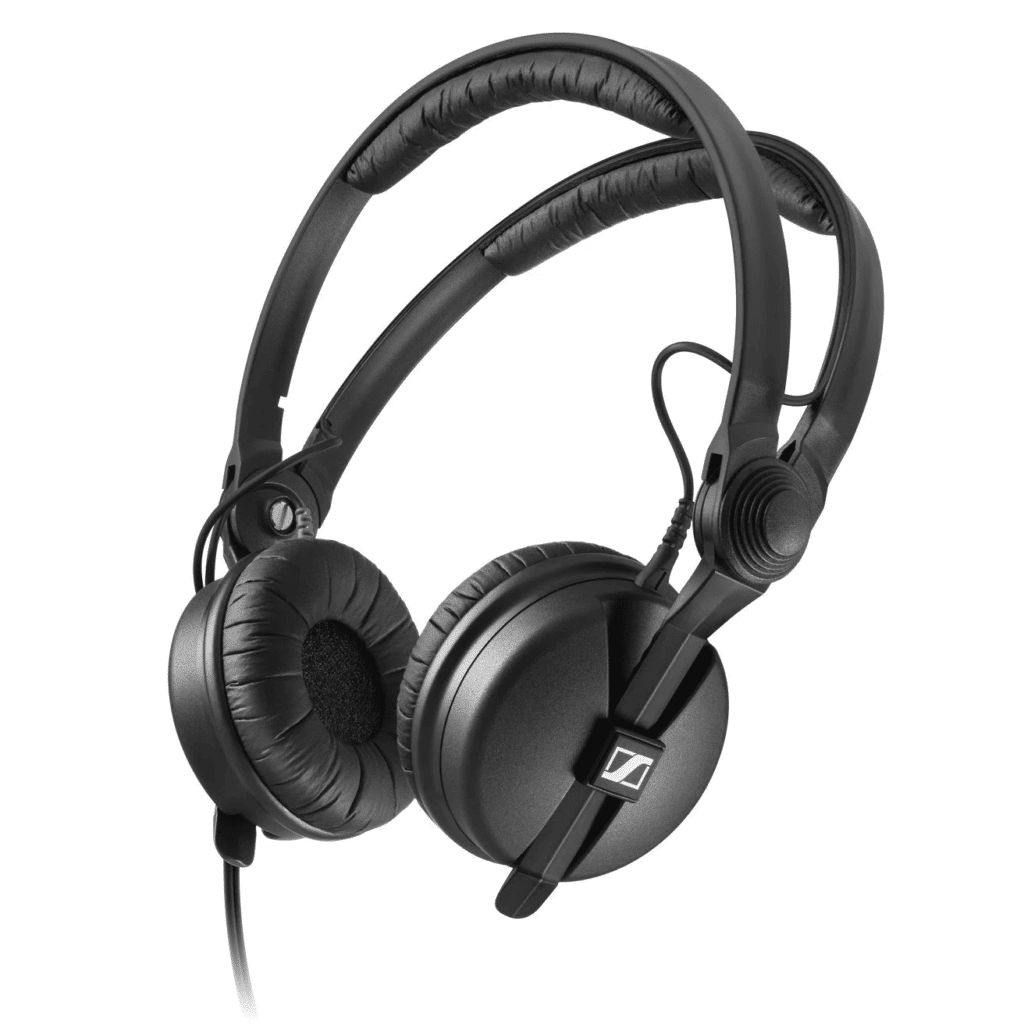
Pros
- Single-ear listening
- Detachable cable
- High sound pressure level handling
Cons
- Can be uncomfortable for longer hours
- Small soundstage
6. AKG K72 – Best for the build quality
| Price | $65 |
| Type | Closed-back |
| Mic | No |
| Frequency response | 16 – 20,000 Hz |
| Product link | Check here |
The AKG K72 is the mid-level headphone in the K series. It is one of the first choices of beginners with it’s affordable pricing. The detailed and balanced high-frequency response produced high-quality vocals and musical instruments.
They have a 40MM driver, which is a good option at this price. They offer low impedance for better connectivity across devices and include earpads that can be replaceable. Despite these benefits, its drawbacks are its large earcups obstruct ease of use.

Pros
- Affordable
- Better connectivity across multiple devices
- Lightweight
- Good build quality
- Beginner friendly
Cons
- Not foldable
- Not glasses friendly
7. Sennheiser HD280 Pro – Best overall
| Price | $100 |
| Type | Closed-back |
| Mic | No |
| Frequency response | 8 – 25000 Hz |
| Product link | Check here |
This podcasting headphone is used by many beginners and experienced podcasters, including Joe Rogan. These headphones offer excellent noise isolation, making users record even in the noisiest environments. They were by far one of the most comfortable headphones I wore and helped me listen for longer hours without a hitch.
These headphones sit at a very comfortable price and provide the right value on investment. They are not too cheap to miss out on premium features and not too expensive. Its collapsable design allows it to be fit easily in your bags and carried easily.
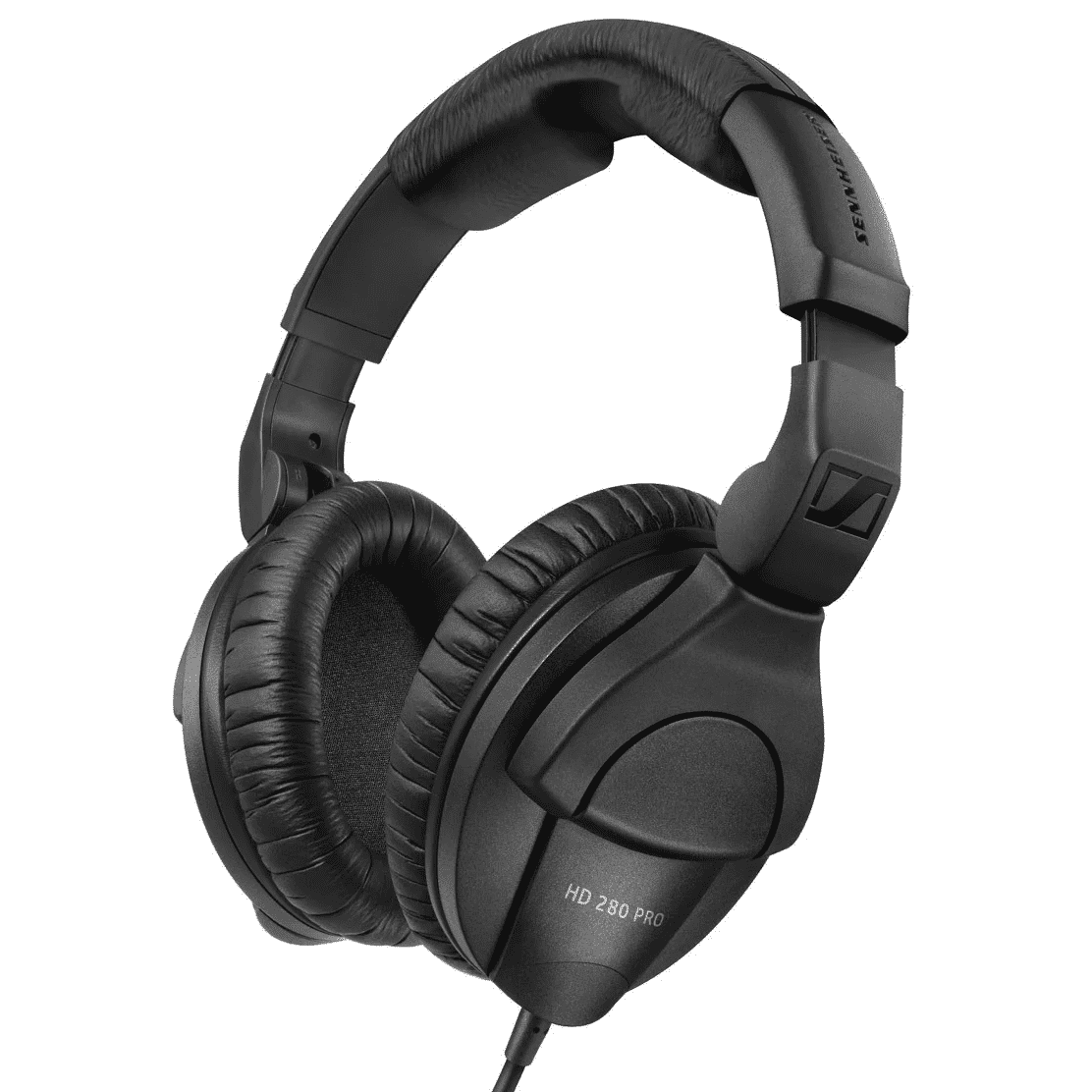
Pros
- Rugged and durable
- Optimally balanced sound profile
- Comfortable for long record sessions
- Impressive noise isolation
- Affordable
Cons
- Lacks features
- Can heat up after long hours
8. Audio-Technica BPHS1 – Best for its in-built microphone
| Price | $219 |
| Type | Closed-back |
| Mic | Yes |
| Frequency response | 20 – 20,000 Hz |
| Product link | Check Here |
This is the first headphone on this list to have a high-quality built-in microphone. They have been specially designed for interviews and announcements and are used across news and sports presenters quite often.
The high-output dynamic microphone can be mounted on a flexible gooseneck boom and can be worn on either side of the earphone.
As it is more sensitive to the sound coming in front of it directly, they are ideal for recording podcasting sessions. This headphone can be the perfect choice for beginners who don’t have a professional microphone yet.
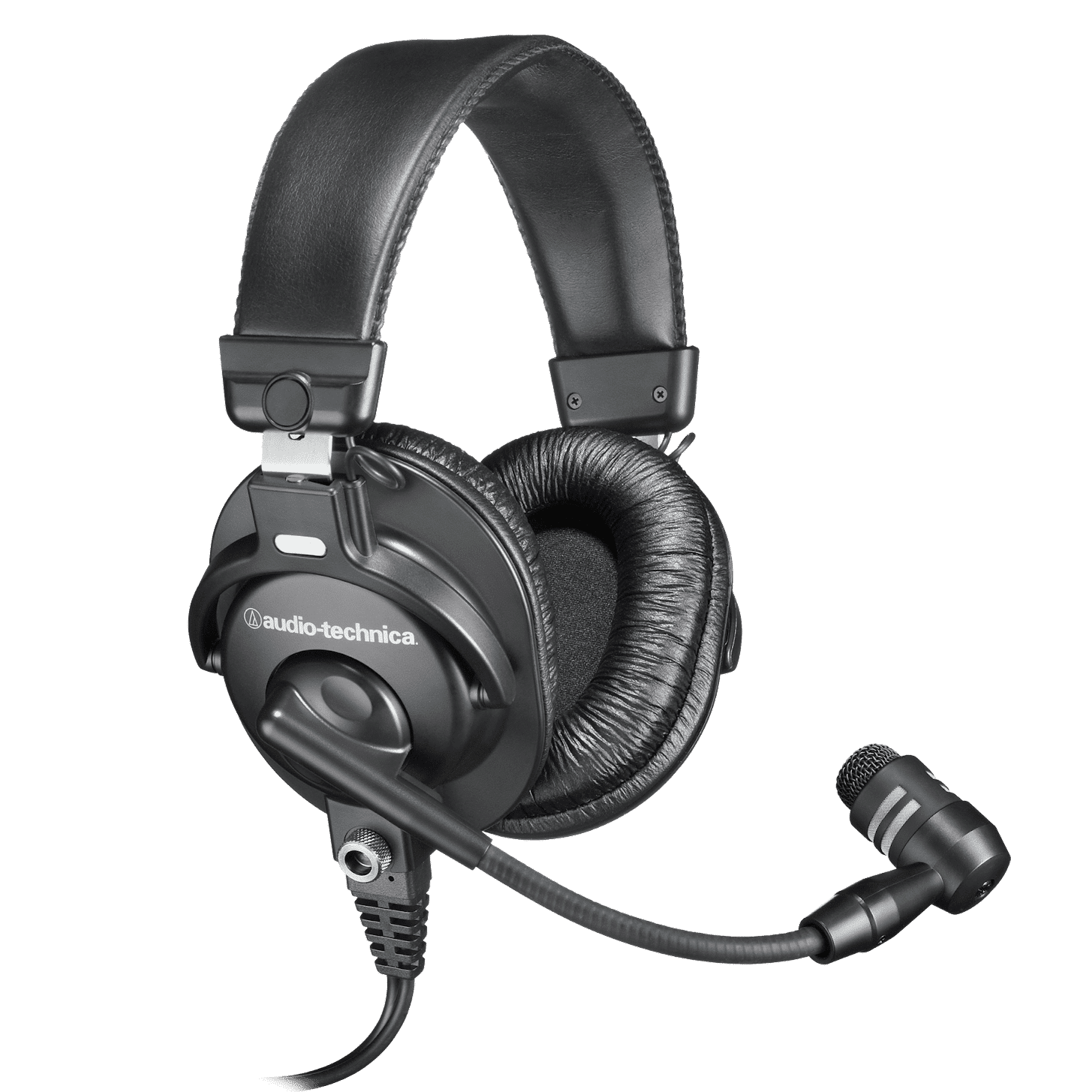
Pros
- Excellent noise isolation
- Movable microphone
- Stable sound
- Portable with a microphone
- Superior comfort
Cons
- Expensive than other similar options
- Can feel heavy
9. Beyerdynamic DT 1770 PRO – Best for its highs and bass
| Price | $529 |
| Type | Closed-back |
| Mic | No |
| Frequency response | 5 Hz to 40,000 Hz |
| Product link | Check here |
This is an advanced podcasting headphone. It is the next version of the previous Beyerdynamic option. The headphones offer a wide soundstage as they use the Tesla 2.0 technology that produced brilliant highs and bass when I used them. The 45 MM dynamic tesla neodymium drivers give a frequency response of 5 Hz to 40,000 Hz.
Its superb German build quality includes a rugged band of spring steel, two types of earpads (Velour and Leatherette), and two types of cables (Coiled and Straight). These headphones could have been better in terms of their portability and affordability.
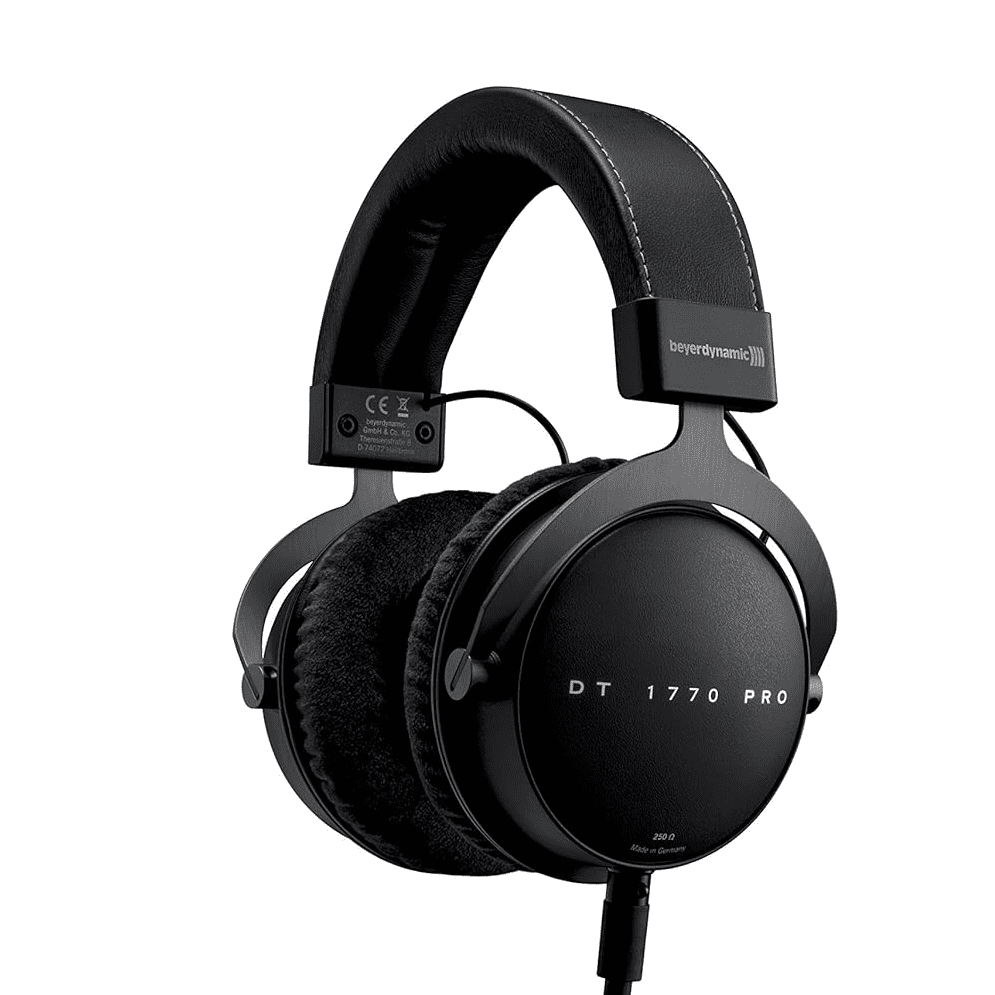
Pros
- Build quality
- Closed-back
- Comfortable for long hours
- Cable variants offered
- Larger earcups
Cons
- Can feel tighter on head
- Expensive
10. Rode NTH100 – Best for its comfort
| Price | $145 |
| Type | Closed-back |
| Mic | No, option to attach external mic |
| Frequency response | 5 – 35,000 Hz |
| Product link | Check here |
These headsets for podcasting are from a well-known microphone manufacturer, “Rode.” This headphone is comfortable and offers superior audio quality at the price point. It came with contoured earcups that made them comfortable to wear.
The headphones have custom-matched drivers designed to fetch maximum high-quality output and accurate frequency response and offer double-sided cable connectivity with a durable headband.
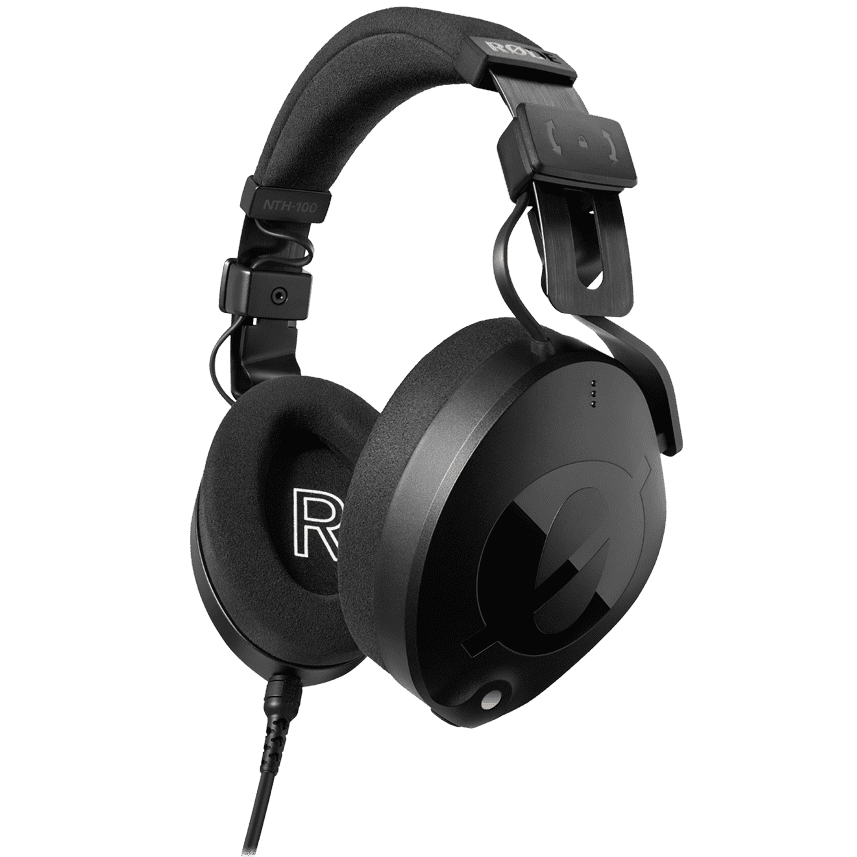
Pros
- Ergonomic earcups
- Specially designed foam for long hours
- Attachable mic option
- Good build quality
- Comfortable for long hours
Cons
- Heavier than many headphones
- Cannot be folded
Bonus: We at Demandsage have covered the best podcasting recording software that can assist you in recording podcasts efficiently.
11. Audio Technica ATH-m20x – Best for being a budget option
| Price | $49 |
| Type | Over-ear |
| Mic | Not available |
| Frequency response | 15 Hz – 20,000 Hz |
| Product link | Check here |
The next headset from Audio Technica, the ATH-m20x, is yet another budget option that can nurture your podcasting needs. This is one of the best entry-level podcasting headphones with an affordable $49 price tag.
These headsets offer a single cable exit, which means they will offer better comfort and won’t come your way while working. The frequency of these is tuned for low-frequency performance and designed for studio mixing and editing.
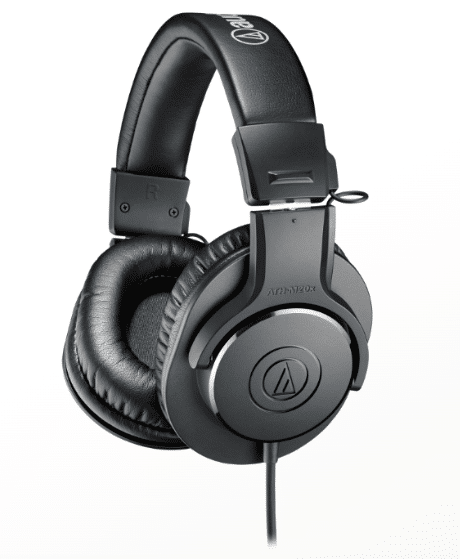
Pros
- Longer cable for better maneuverability.
- Budget-friendly option.
- Effective sound isolation with circumaural designs.
- Great durability for the price.
Cons
- Not suitable for longer hearing periods.
- Does not have a microphone port.
12. Bose QuietComfort 35 – Best for design and versatility
| Price | $189 |
| Type | Over the ear |
| Mic | Yes |
| Frequency response | 20 Hz – 20,000 Hz |
| Product link | Check here |
This podcasting headset from Bose is a reliable all-round option, in my opinion. With the ability to connect to devices with Bluetooth, it delivers more versatility even for tasks other than podcasting. For podcasting, it impressed me with the mobility, play/pause button assistance, and superior noise cancellation.
The Bluetooth offers a decent range of support of up to 30 feet and a battery life of up to 20 hours; these bose earpieces offer great support for on-the-go podcasting. These are also the best-looking headphones on this list, with a smooth matte finish and 2 color options.
Pros
- Very comfortable with plush cushions
- Great connectivity across devices
- Touch controls + voice assistant support
- Great acoustic noise cancellation
Cons
- Priced premium
- Bass too heavy for audiophiles
13. Shure SRH440 – Best for editing and mixing
| Price | $99 |
| Type | Over ear |
| Mic | No |
| Frequency response | 10 Hz – 22,000 Hz |
| Product link | Check Here |
The Shure SRH 440 offers good frequency response and is a great suit for podcasting, recording and mixing. The headset offers 40mm neodymium drivers that power a good balance with reduced distortion
The over-the-ear comfort is great, with good cushioning, offering complete sealing of the ears. Although the brand claims it to be slim and sleek, I personally did not like the design and found it a bit bulky.
Pros
- Great for critical listening and mixing
- Solid, robust build
- Great isolation with over-ear design
- Great budget option
Cons
- Unimpressive design
- Decent Bass performance
- Uncomfortable for spectacle users for long hours
How to buy the right headphones for podcasting?
While buying headphones for your podcasting use, you should consider the level of usage or the amount that you can invest in a professional headset. Based on those factors, you can find the right pair for you.
These points below can used as a quick checklist while going through the headphone options. Have a look:
- Sound Quality
- Ear Comfort
- Durability
- Ease of Connecting
- Pricing
- Type of headphones
These pointers will surely help you make the choice. One additional factor you can consider is the nature of use. If you travel or move places for recording and editing, portability can be an important factor to consider.
- Ever wondered how much do podcast hosts make? Check out our article to uncover podcasters’ income!
Why do you need headphones for Podcasting?
For someone who hosts podcasts and is their primary or major source of income, investing in good headphones can help with various obstacles. Contrary to the general belief of only giving audio as an output, these high-level equipment do more than that.
Some of the key benefits of headphones in podcasting:
- Voice Isolation – Also known as a spill or leakage where the microphone picks up audio from a source different than it is meant to. Good quality headphones will help prevent this and give you a clear, undistorted output.
- Audio Monitoring – It is the feedback that a user can get about their speech. Better earphones will help you identify the ums, ahs, throat clear sounds, and stutters more effectively.
- Balanced and consistent audio – A good pair of headphones allows users to have all the elements in the output. This helps make the perfect final cut and gives you less editing work to worry about.
Demandage’s advice: Selecting equipment for a podcast is crucial, and we know it. If you are also looking to buy equipment besides headphones, here is our ultimate podcast equipment guide to choose the best.
Different models/types of headphones for Podcasting?
Before we head into exploring the different choices of headphones, understanding their different types and variants is essential. I will explain the major categories and their differences, which can help you assess your needs.
While the choice depends upon the use case of the headphones, the best headphones for podcasts can vary as per their connectivity, type, and features.
- Wired Headphones vs. Wireless Headphones
The first and the most common question that comes to a user’s mind while buying a headphone is its connectivity. Wired headphones are best for their audio output, while wireless offer the ability to connect to multiple devices.
| Wired Headphones | Wireless Headphones |
|---|---|
| Better audio quality | Better mobility |
| Cheaper than wireless | Connect across multiple devices |
- Open-back headphones vs closed-back headphones
Open-back and closed-back headphones have their differences in terms of their features. Open-back headphones offer a natural sound and allow air to follow through. Closed-back headphones are completely covered and allow minimum sound leakage.
| Open-back headphones | Closed-back headphones |
|---|---|
| Lighter in weight | Limited sound leakage |
| More natural sounding audio | Better sound isolation |
| Comfortable for a longer time | More effective in editing |
- In-ear headphones vs over-ear headphones vs. On-ear headphones
These categories of headphones differ in their shape and wearability. While it depends on the user’s needs, each of these have their own unique features. Have a look:
| In-ear headphones | Over-ear headphones | On-ear headphones |
|---|---|---|
| More portable | Not portable | Lightweight and portable |
| Small driver size | More comfortable | More open sound |
| Effective noise isolation | Fit well over the ear | Not suitable for long hearing time |
- Headphones with a mic vs. Headphones without a mic
Every podcast host has a dedicated microphone for catching audio in the highest possible quality. Yet, some headphones offer impressive recording capabilities.
| Headphones with a mic | Headphones without a mic |
|---|---|
| Useful for recording on the go | Restricted usage |
| Great backup option if studio mic fails | Better audio recording (with an external mic) |
Our Top #3 Picks of podcasting headphones
To conclude, the best headphones for podcasting should be a perfectly balanced mix of comfortable, affordable, and great-quality devices. It is not necessary that the most expensive one would be the ideal pick for you.
To help you choose, below are three headphones for different use cases. See which one suits you best.
- Sennheiser HD280PRO – best overall
- Beyerdynamic DT 1770 PRO – best for a premium sound experience
- Rode NTH100 – best mid-range headphones
Remember, the type of headphones and its specifications will matter a lot. This should be a long-term investment; if you are a beginner, you should pay extra attention to the equipment you invest in.
Happy recording!
Demandsage’s More Resources On Podcast:
FAQs
You do not need a microphone in your headphones. It is an added feature, but usually professional microphones should be used for recording.
Closed-back headphones with comfortable earcups and headbands should be preferred for podcasting.
Wireless headphones are not usually used for podcasting as they are not as good as wired ones. The sound usually lags and does not provide the quality.
You can use AirPods for recording in a quiet environment, but usually, for professional purposes, AirPods are not preferred for podcasting.
